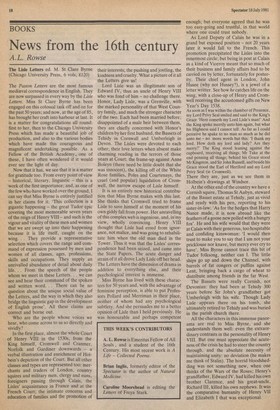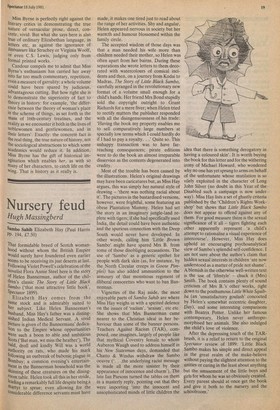BOOKS
News from the 16th century
A.L. Rowse
The Lisle Letters ed. M. St Clare Byrne (Chicago University Press, 6 vols, £120) The Paston Letters are the most famous medieval correspondence in English. They are now surpassed in every way by the Lisle Letters. Miss St Clare Byrne has been engaged on this colossal task off and on for the past 50 years; and now, at the age of 85, has brought her craft into harbour at last. It is a matter for congratulations all round: first to her, then to the Chicago University Press which has made a beautiful job of production, and also to the various bodies which have made this courageous and magnificent undertaking possible. As a Fellow of the British Academy„ one of these, I have often wondered if it would ever see the light of day.
Now that it has, we see that it is a matter for gratitude too. From every point of view — historical, literary, linguistic — this is a work of the first importance; and, as one of the few who have worked over the ground, I can say that Miss Byrne is entirely justified in her claims for it. 'This collection is a gigantic happening — the great Tudor epic covering the most memorable seven years of the reign of Henry VIII— and such is the vigour and vitality of these men and women that we are swept up into their happening because it is life itself, caught on the wing. . . They provide a representative selection which covers the range and command of expression possessed by men and women of all classes, ages, professions, skills and occupations. They supply an unrivalled abundance of detail about daily life. . . From the speech of the people whom we meet in these Letters. . . we can see and hear their command of the spoken and written word. . . There can be no question about the unique social value of the Letters, and the way in which they also bridge the linguistic gap in the development of English prose'. All these claims are correct and borne out.
Who are the people whose voices we hear, who come across to us so directly and vividly?
In the first place, almost the whole Court of Henry VIII in the 1530s, from the King himself, Cromwell and Cranmer, Norfolk and Gardiner downwards — a verbal illustration and enrichment of Holbein's depiction of the Court. But all other classes and types are represented too: merchants and traders of London, country squires and military men, clergy and nuns, foreigners passing through Calais, the Lisles' acquaintance in France and at the French Court; the intimate concerns and education of families and the promotion of their interests; the pushing and jostling, the kindness and cruelty. What a picture of it all the Letters give us!
Lord Lisle was an illegitimate son of Edward IV, thus an uncle of Henry VIII who was fond of him — no challenge there. Honor, Lady Lisle, was a Grenville, with the marked personality of that West Country family, and much the stronger character of the two. Each had been married before; disappointed of a male heir between them, they are chiefly concerned with Honor's children by her first husband, the Bassets of Tehidy in Cornwall and Umberleigh in Devon. The Lisles were devoted to each other; their love letters when absent make charming reading in the terrors of those years at Court: the frame-up against Anne Boleyn (there need be little doubt that she was innocent), the killing off of the White Rose families, Poles and Courtenays, the cruel (and popular) liquidation of Cromwell, the narrow escape of Lisle himself.
It is an entirely new historical contribution that Miss Byrne makes with this last. She thinks that Cromwell tried to frame Lisle to save himself at the moment of his own giddy fall from power. Her unravelling of this complex web is ingenious, and, in my view, wholly convincing. Henry VIII thought that Lisle had erred from ignorance, not malice, and was going to rehabilitate him when the old man died in the Tower. Thus it was that the Lisles' correspondence had been seized, and came into the State Papers. The acute danger and strain of it all drove Lady Lisle off her head. The Letters have the dimension of drama in addition to everything else, and their psychological interest is immense.
Miss Byrne has lived with these characters for 50 years and, with the advantage of feminine perception, is able to put Professors Pollard and Merriman in their place, neither of whom had any psychological subtlety. And she persuades me to a better opinion of Lisle than I held previously. He was honourable and perhaps competent enough; but everyone agreed that he was too easy-going and trustful, in that world where one could trust nobody.
As Lord Deputy of Calais he was in a grand but exposed position — not 20 years later it would fall to the French. This promotion precipitated the Lisles into the innermost circle; but being in post at Calais as a kind of Viceroy meant that so much of their business and family affairs had to be carried on by letter, fortunately for posterity. Their chief agent in London, John Husee (why not Hussey?), is a jewel of a letter writter. See how he catches life on the wing, with a close-up of Henry and Cromwell receiving the accustomed gifts on New Year's Day 1538.
As soon as I was within the chamber of Presence, my Lord Privy Seal smiled and said to the King's Grace 'Here cometh my Lord Lisle's man!' And the King spoke merrily unto him again, but what his Highness said I cannot tell. As far as I could perceive he spake to no man so much as he did unto me — no more words but this: 'I thank my lord. How doth my lord and lady? Are they merry?' The King stood leaning against the cupboard, receiving all things; Mr Tuke at the end penning all things; behind his Grace stood Mr Kingston, and Sir John Russell, and beside his Grace stood the Earl of Hertford and my Lord Privy Seal (ie Cromwell).
There they are, just as we see them in Holbein's drawings at Windsor.
At the other end of the country we have a Cornish squire, Thomas St Aubyn, steward of the Basset estate at Tehidy, just as vivid and ready with his pen, reporting to his sister-in-law: 'As for the hedges that Harry Nance made, it is now abroad like the feathers of a goose new polled with a hungry fox'. He and his wife would that they were at Calais with their generous, too hospitable and confiding kinswoman: 'I would then trust to make you to say that I am not your pricklouse nor knave, but mercy ever cry to have'. Miss Byrne cannot trace this bit of Tudor folksong, neither can I. The little ships go up and down the Channel, with barrels of fat congers or puffins against Lent, bringing back a cargo of wheat to distribute among friends in the far West.
The Bassets were really Cornish, not Devonian: they had been at Tehidy 300 years before Sir John's grandfather got Umberleigh with his wife. Though Lady Lisle appears there on his tomb, she ultimately retired to Tehidy and was buried in the parish church there.
All the characters in this immense panorama are real to Miss Byrne, and she understands them well: even the extraordinary contrasts in the personality of Henry VIII. But one must appreciate the acuteness of the crisis he had to steer the country through, and the absolute necessity of maintaining unity: no deviation (he makes me think of Stalin). The horrid bloodshedding was not something new, when one thinks of the Wars of the Roses; Henry's grandfather, Edward IV, had killed his own brother Clarence, and his great-uncle, Richard III, killed his own nephews. It was the comparative humanity of Henry VII and Elizabeth I that was exceptional. Miss Byrne is perfectly right against the literary critics in demonstrating the true nature of vernacular prose, direct, concrete, vivid. But what she says here is also true of ordinary Elizabethan language, in letters etc, as against the ignorance of litterateurs like Strachey or Virginia Woolf, or even C.S. Lewis, judging only from formal printed works.
Candour compels me to admit that Miss Byrne's enthusiasm has carried her away into far too much commentary, repetition, even a measure of garrulity: a whole volume could have been spared by judicious, advantageous cutting. But how right she is to demonstrate the superiority of fact to theory in history: for example, 'the difference between the theory of woman's place in the scheme of things, as set forth in the mass of 16th-century treatises, and the reality as we encounter it both in the lives of noblewomen and gentlewomen, and in their letters'. Exactly: the concrete fact is the real thing, the true nature of history, not the sociological abstractions to which some academics would reduce it. In addition, Miss Byrne has the gift of historical imagination which enables her, as with so Many of her characters, to catch life on the Wing. That is history as it really is.



































 Previous page
Previous page